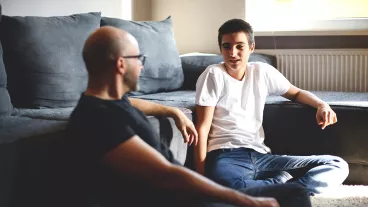Children in separated families feel left out and left "in the dark" when it comes to decisions about their lives
You are in an archived section of the AIFS website
July 2018
Download Media release
The qualitative study of Children and Young People In Separated Families found most of the 61 study participants felt dissatisfied with their level of input, and with how well they were kept informed, in the decisions about their living arrangements after their parents’ separation.
Three quarters of the children and young people said that they wanted their parents to listen more to their views when they were working out parenting arrangements. And most wanted to be heard better by family law professionals, especially when they spoke about their own safety.
Perceived inaction on the part of family law system professionals, particularly in response to safety concerns raised by children and young people, caused distress for a number of study participants.
Institute Director, Anne Hollonds said a strong theme emerging from the study was that the children and young people felt they were not consulted or they were not heard by a range of family law professionals.
“These children often felt they were kept in the dark and were unclear about what was happening about decisions affecting their lives,” Ms Hollonds said.
The study findings will be presented to the 15th Australian Institute of Family Studies’ conference in Melbourne next week from Wednesday July 25 - Friday July 27.
Senior Research Fellow, Dr Rachel Carson said that a key theme emerging from the interviews with the children and young people, aged from 10 to 17 years-old, was the significance of having ‘someone’ to listen to them and then communicate their views so that their views could inform decision making.
“Some children and young people described their direct engagement with service providers, including counsellors, family consultants/family report writers and independent children’s lawyers (ICL) in positive terms. However, most of the study participants who could recall engaging with family law system professionals expressed negative views of the process and experienced uncomfortable interactions with these professionals,” Dr Carson said.
“Some of these young participants described the legal process as focusing more on what their parents wanted, particularly where they had limited or no interaction with these service providers.
“Some children and young people also reported feeling marginalised by ICLs, family consultants and family report writers, or that they failed to genuinely listen to them, even when they recounted painful experiences of family violence.
“Some children described distressing breaches of trust when, having recounted experiences of family violence, they were reunited with the perpetrator during the family report sessions or when they faced repercussions from a parent on the release of a family report.”
Dr Carson said well-intentioned attempts by parents and professionals to shield children and young people from their parents’ litigation may lead to children and young people’s views not being respected or acknowledged during family breakdown.
“For example, an important issue for many children and young people is the need to have some flexibility and to have a say in changing their living arrangements when they believe it is unsafe or unworkable,” she said.
“An increased commitment to child-inclusive approaches to post separation decision making would be an important step towards meeting the loud and clear calls to “give children a bigger voice, more of the time.”
Key learnings from the report that would make the family law system more child-inclusive:
- Enabling children to contribute to, and be accurately heard in the decision-making process, and keeping them independently informed of the nature and progress of this decision-making process
- Giving children a clear and accurate explanation of any decisions made
- Providing access to ongoing therapeutic support and assistance as required
- Allowing the potential for flexibility to change parenting arrangements and have ongoing and meaningful communication.
- Providing relevant training to professionals to improve their ability to build trust with, and support, children and young people.
Media contact
Kate O'Connor
Phone: 0499 860 257
Email: kate.o'[email protected]
